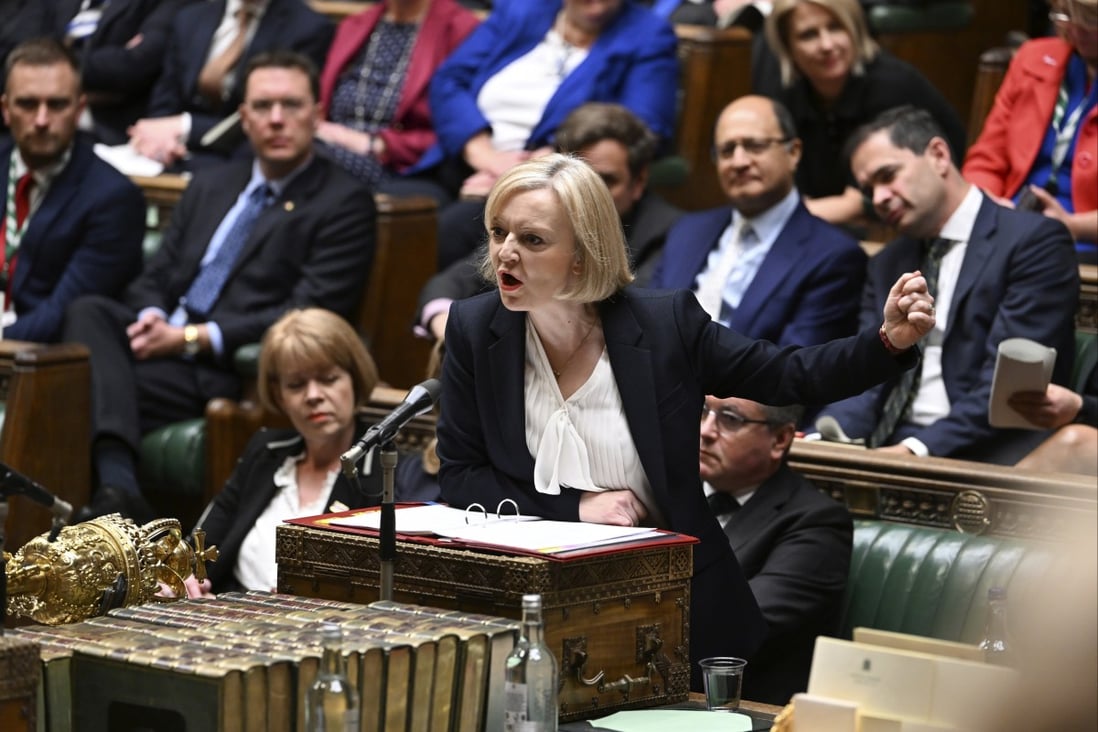Bond vigilantes can intimidate the UK, but China is harder to bully
* The economic fallout from the pandemic has given bond vigilantes a new lease on life, evident in the response to the turmoil in Britain
* These bond investors have less sway in China, but its ‘zero-Covid’ policy and lockdowns still weigh on sentiment and hopes of a stock rally
Published: 4:30pm, 20 Oct, 2022 Updated: 4:30pm, 20 Oct, 2022

Britain’s prime minister Liz Truss answers questions at the House of Commons in London on October 19. Photo: UK Parliament/ AP
It is a quote that, prior to the mayhem in Britain’s financial markets during the past several weeks, was associated with a bygone era in global finance. James Carville, once an adviser to US President Bill Clinton, said in 1993, “I used to think that if there was reincarnation, I wanted to come back as the president or the pope or a .400 baseball hitter. But now I want to come back as the bond market. You can intimidate everybody.”
The “bond vigilantes” – a term coined by economist Ed Yardeni to describe the ability of global debt investors to impose fiscal discipline on spendthrift governments by driving up their borrowing costs sharply – were nowhere to be seen in the last two decades.
The combination of subdued inflation and the distortive effects of years of ultra-loose monetary policy kept the vigilantes at bay. However, the economic fallout from the Covid-19 pandemic – which forced governments to launch massive stimulus programmes that contributed to the surge in prices – gave them a new lease on life.
As interest rates rise and investors become more sensitive to vulnerabilities in a global economy that risks sliding into recession, the disciplining force of markets is reasserting itself.
Britain has been a red rag to a bull. The fiscal recklessness of Prime Minister Liz Truss’s government caused one of the in an advanced economy in recent memory, forcing Truss most of the unfunded tax cuts that triggered the turmoil and leaving her premiership hanging by a thread.
In a report published on Tuesday, JPMorgan said the market revolt in the UK was “a wake-up call for central banks and governments alike” the world over. Although Britain’s crisis was , other countries are vulnerable, particularly ones where sentiment has already deteriorated significantly and where tensions between government policies and markets are most acute.
Among the world’s major economies, China has caused investors the most distress. Stock markets, particularly Chinese equities listed in the United States and Hong Kong, have fallen almost relentlessly since February 2021. The sell-off deepened this year, with heavy outflows from bond markets amid a 13 per cent drop in the yuan versus the US dollar. An index of US dollar-denominated Chinese junk bonds has lost more than half its value since its peak last year.
The overriding factor, in investors’ eyes, is Beijing’s , which includes the frequent imposition of growth-sapping lockdowns in an effort to halt the spread of the virus. While other risks – in particular the crisis in – have eroded confidence in China’s economy, the zero-tolerance approach to the virus is far and away the main area of contention between markets and Beijing. It is also one of the biggest drags on the global economy.
Yet, while the government has been forced to take more aggressive measures to , it has not budged on its zero-Covid policy. President Xi Jinping intensified the stand-off with markets on Sunday by at the Communist Party’s 20th Party Congress, avoiding setting a timeline for lifting restrictions.
This is not just because the Communist Party is a much tougher opponent for markets than Western governments. It is also because the vigilantes have little leverage in China.
Beijing itself has , with the International Monetary Fund noting in a report published in January that fiscal policy “turned strongly contractionary” in early 2021 as the policy focus shifted to regulatory tightening and deleveraging. Moreover, consumer inflation remains subdued – partly because of by lockdowns – while China runs a current account surplus, in stark contrast to Britain.
Furthermore, China is less exposed to the global financial cycle, with the country’s monetary policy largely independent from that of other advanced economies. While Chinese bonds have been stripped of over US Treasuries, contributing to capital outflows, their low correlation with the world’s most liquid debt markets is one of the factors that makes them appealing to many international investors.
That markets pose less of a threat in China is no bad thing. Living with the virus might not be an option given and a poorly funded health system. Moreover, whenever the vigilantes have forced the hand of governments, tough austerity measures have ensued and invariably ended up causing a recession, precisely the situation in which Britain .
This does not mean that markets are impotent in China. The zero-Covid policy has become the main determinant of sentiment towards Chinese assets and is the key impediment to a meaningful and durable rally, especially in stock markets where valuations for some time.
Investors are not in a forgiving mood this year. The vigilantes are bound to intimidate other profligate governments, with Italy particularly at risk. China is not in their sights, but market pressure is palpable. Without an end to disruptive lockdowns, Chinese asset prices will remain under severe strain.
